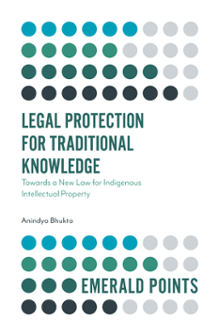
Prelims
Legal Protection for Traditional Knowledge
ISBN: 978-1-80043-066-2, eISBN: 978-1-80043-063-1
Publication date: 18 June 2020
Citation
Bhukta, A. (2020), "Prelims", Legal Protection for Traditional Knowledge, Emerald Publishing Limited, Leeds, pp. i-xii. https://doi.org/10.1108/978-1-80043-063-120200001
Publisher
:Emerald Publishing Limited
Copyright © 2020 Emerald Publishing Limited
Half Title Page
Legal Protection for Traditional Knowledge
Title Page
Legal Protection for Traditional Knowledge
Towards a New Law for Indigenous Intellectual Property
Anindya Bhukta

United Kingdom – North America – Japan – India Malaysia – China
Copyright Page
Emerald Publishing Limited
Howard House, Wagon Lane, Bingley BD16 1WA, UK
First edition 2020
Copyright © 2020 Emerald Publishing Limited
Reprints and permissions service
Contact: permissions@emeraldinsight.com
No part of this book may be reproduced, stored in a retrieval system, transmitted in any form or by any means electronic, mechanical, photocopying, recording or otherwise without either the prior written permission of the publisher or a licence permitting restricted copying issued in the UK by The Copyright Licensing Agency and in the USA by The Copyright Clearance Center. Any opinions expressed in the chapters are those of the authors. Whilst Emerald makes every effort to ensure the quality and accuracy of its content, Emerald makes no representation implied or otherwise, as to the chapters' suitability and application and disclaims any warranties, express or implied, to their use.
British Library Cataloguing in Publication Data
A catalogue record for this book is available from the British Library
ISBN: 978-1-80043-066-2 (Print)
ISBN: 978-1-80043-063-1 (Online)
ISBN: 978-1-80043-065-5 (Epub)


Dedication
my wife
source of my inspiration
Preface
Misappropriation of different types of traditional knowledge of different countries is, nowadays, a thriving business and hence a great challenge to the developing world, especially to the developing countries of the Southern hemisphere. The aboriginal communities of these developing countries, who possess this knowledge, are getting deprived as a result. The multi- national companies of developed countries, who are especially misappropriating this knowledge, neither recognize the contribution of these people, nor do they share the benefits arising out of the commercial use of this knowledge with these people. All these can happen due to the absence of any appropriate law to protect this valuable knowledge base. Presently different countries are trying to prevent these misappropriations with the help of existing intellectual property rights laws. Some sui generis laws have also been developed. But the problem is that most of these initiatives consider a particular dimension of this multi-dimensional knowledge suited to their objectives. What is happening as a result is that very often these laws are becoming overlapping and contradictory. To overcome this problem what is the need of the hour is to develop a comprehensive law which will encompass all the dimensions of traditional knowledge.
The objective of the present study, ‘Legal Protection for Traditional Knowledge: Towards a New Law for Indigenous Intellectual Property’ is to find out the lacunas of the present legislative structure and to propose the outlines of a law, its objectives and provisions that could protect the rights of the traditional knowledge holders. Accordingly, the study defines the term traditional knowledge, addresses its different dimensions and explores the economic importance of this knowledge. How this issue is addressed in different international and national forums, how different existing IPR laws try to protect the rights of knowledge-holders, what initiatives are taken by different countries – all such issues are discussed in the present treatise. The study also explains the limitations of existing laws in this regard. Finally, on the basis of the above analysis, a sui generis law – what should be the objectives of the law, what provisions should be included in the law – has been suggested.
The present work is the outcome of my decade-long study on different issues on intellectual property rights. It's my great pleasure that a renowned publishing house like Emerald Publishing Limited has come forward to bring my work to the notice of the world of intellectuals. I would always be indebted to all the family members of Emerald, especially to Nick Wolterman, who extended immense support to me throughout this journey with Emerald. I would also like to convey my sincere gratitude to Professor Sebak Kumar Jana of Vidyasagar University, West Bengal, for his valuable suggestions in completing the work. Above all, I must acknowledge the fact that the work would not have started at all if Professor Raj Kumar Sen had not been there to literarily insist on my serious pursuit of the project. Professor Sen is no longer among us. I shall feel his absence once more when this book finally sees the light of the day.
Anindya Bhukta
Arambagh
January 25, 2019
- Prelims
- 1 Introduction
- 2 Traditional Knowledge: An Overview
- 3 Bio-piracy
- 4 Protecting Traditional Knowledge: Ways and Means
- 5 Initiatives to Protect Traditional Knowledge
- 6 How Fit Are the Existing Intellectual Property Rights Laws in Protecting Traditional Knowledge?
- 7 Towards a New Law
- Notes
- References
- Index